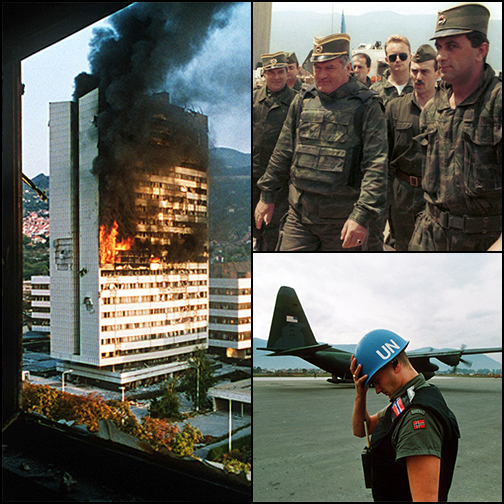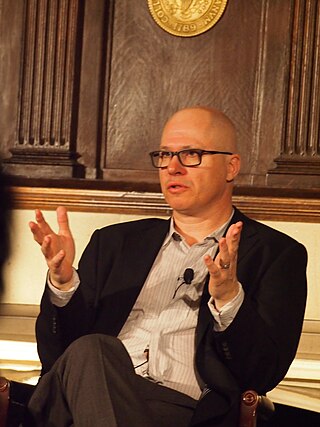
Alija Izetbegović was a Bosnian politician, lawyer, Islamic philosopher and author, who in 1992 became the first president of the Presidency of the newly independent Republic of Bosnia and Herzegovina. He served in this role until 1996, when he became a member of the Presidency of Bosnia and Herzegovina, serving until 2000.

The Yugoslav Wars were a series of separate but related ethnic conflicts, wars of independence, and insurgencies that took place in the SFR Yugoslavia from 1991 to 2001. The conflicts both led up to and resulted from the breakup of Yugoslavia, which began in mid-1991, into six independent countries matching the six entities known as republics which previously composed Yugoslavia: Slovenia, Croatia, Bosnia and Herzegovina, Montenegro, Serbia, and North Macedonia. Yugoslavia's constituent republics declared independence due to unresolved tensions between ethnic minorities in the new countries, which fuelled the wars. While most of the conflicts ended through peace accords that involved full international recognition of new states, they resulted in a massive loss of life as well as severe economic damage to the region.

The Bosnian War was an international armed conflict that took place in Bosnia and Herzegovina between 1992 and 1995. The war is commonly seen as having started on 6 April 1992, following a number of earlier violent incidents. The war ended on 14 December 1995 when the Dayton accords were signed. The main belligerents were the forces of the Republic of Bosnia and Herzegovina and those of Herzeg-Bosnia and Republika Srpska, proto-states led and supplied by Croatia and Serbia, respectively.
Sir Noel Robert Malcolm, is an English political journalist, historian and academic. A King's Scholar at Eton College, Malcolm read history at Peterhouse, Cambridge, and received his doctorate in history from Trinity College, Cambridge. He was a Fellow and College Lecturer of Gonville and Caius College, Cambridge, before becoming a political and foreign affairs journalist for The Spectator and the Daily Telegraph.
Irfan Ljubijankić was a Bosnian facial surgeon, classical music composer, politician and diplomat. He served as Minister of Foreign Affairs of the Republic of Bosnia and Herzegovina from 30 October 1993 until he was killed in action on 28 May 1995 during the Bosnian War.

Aleksandar Hemon is a Bosnian-American author, essayist, critic, television writer, and screenwriter. He is best known for the novels Nowhere Man (2002) and The Lazarus Project (2008), and his scriptwriting as a co-writer of The Matrix Resurrections (2021).

The Republika Srpska was a self-proclaimed state in Southeastern Europe under the control of the Army of Republika Srpska during the Bosnian War. It claimed to be a sovereign state, though this claim was only partially recognized by the Bosnian government in Geneva agreement, the United Nations, and Yugoslavia. For the first few months of its existence, it was known as the Serbian Republic of Bosnia and Herzegovina.

Roger Cohen is a journalist and author. He was a reporter, editor and columnist for The New York Times, and the International Herald Tribune . He has worked as a foreign correspondent in fifteen countries.
Ammiel Alcalay is an American poet, scholar, critic, translator, and prose stylist. Born and raised in Boston, he is a first-generation American, son of Sephardic Jews from Serbia. His work often examines how poetry and politics affect the way we see ourselves and the way Americans think about the Middle East, with attention to methods of cultural recovery in the United States, the Middle East and Europe.
Diana Johnstone is an American political writer based in Paris, France. She focuses principally on European politics and Western foreign policy.
Borislav Herak is a Bosnian Serb former soldier who fought with the Army of Republika Srpska (VRS) in the early days of the Bosnian War. In March 1993, after falling in the hands of the Army of the Republic of Bosnia and Herzegovina (ARBiH), he was put on trial at the Sarajevo Military District Court, becoming the first person to be convicted of genocide on the basis of his own testimony in which he admitted guilt for crimes charged against him—32 murders and 16 rapes.
During the Yugoslav Wars (1991–2001), propaganda was widely used in the media of the Federal Republic of Yugoslavia, of Croatia and of Bosnia.

Radovan Karadžić is a Bosnian Serb politician, psychiatrist and poet. He was convicted of genocide, crimes against humanity and war crimes by the International Criminal Tribunal for the former Yugoslavia (ICTY). He served as the president of Republika Srpska during the Bosnian War.
Adam LeBor is a British author, journalist, writing coach and editorial trainer. Born in London in 1961, he worked as a foreign correspondent from 1991 for many years but is now based in London. Mostly based in Budapest, he also lived in Berlin and Paris and spent substantial amounts of time reporting from the former Yugoslavia.
Emir Suljagić is a Bosnian journalist and politician who is currently the Director of the Srebrenica Genocide Memorial. He served as Minister of Education of Sarajevo Canton from 13 January 2011 until 29 February 2012 and was also Deputy minister of Defense from 31 March 2015 to 10 December 2015.

Ethnic cleansing occurred during the Bosnian War (1992–95) as large numbers of Bosnian Muslims (Bosniaks) and Bosnian Croats were forced to flee their homes or were expelled by the Army of Republika Srpska and Serb paramilitaries. Bosniaks and Bosnian Serbs had also been forced to flee or were expelled by Bosnian Croat forces, though on a restricted scale and in lesser numbers. The UN Security Council Final Report (1994) states while Bosniaks also engaged in "grave breaches of the Geneva Conventions and other violations of international humanitarian law", they "have not engaged in "systematic ethnic cleansing"". According to the report, "there is no factual basis for arguing that there is a 'moral equivalence' between the warring factions".

David Binder was a British-born American journalist, author and lecturer. He resided in Evanston, Illinois, after spending most of his adult life in Washington, D.C., Germany and Serbia.
Vrhbosna was the medieval name of a small region in today's central Bosnia and Herzegovina, centered on an eponymous settlement (župa) that would later become part of the city of Sarajevo.

Marijan Mijo Babić (1903–1941), nicknamed Giovanni, was a deputy of the Croatian fascist dictator Ante Pavelić, and the first commander of all concentration camps in the Independent State of Croatia. He was head of the Third Bureau of the Ustasha Surveillance Service, and was also a member of the Main Ustaše Headquarters, one of the two main deputies of Pavelić.

Bosnian genocide denial is an act of denying that the systematic Bosnian genocide against the Bosniak Muslim population of Bosnia and Herzegovina, as planned and perpetrated in line with official and academic narratives defined and expressed by part of the Serb intelligentsia and academia, political and military establishment, did not occur, or at least it did not occur in the manner or to the extent that has been established by the International Criminal Tribunal for the former Yugoslavia (ICTY) and the International Court of Justice (ICJ) through its proceedings and judgments, and described by subsequent comprehensive scholarship.











